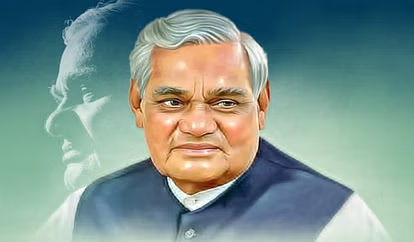
Atal Bihari Vajpayee
Atal Bihari Vajpayee: A Biography

Early Life and Education
Atal Bihari Vajpayee was born in Gwalior, Madhya Pradesh, India, on December 25, 1924. He was the child of Krishna Devi and Krishna Bihari Vajpayee, a teacher. Vajpayee was raised by middle-class Brahmin parents who valued education and cultural heritage highly. He went to Victoria College, now called Laxmi Bai College, after finishing his schooling in Gwalior, where he excelled in Hindi, English, and Sanskrit.
Vajpayee continued on to the prestigious DAV College in Kanpur to do his masters studies in political science. He began writing poetry throughout his college years, and with time, it became an integral part of who he was. He also became interested in reading and public speaking.
Entry into Politics and RSS Involvement
Atal Bihari Vajpayee’s political career began when he joined the Hindu nationalist Rashtriya Swayamsevak Sangh (RSS) in 1939. He was greatly influenced by the teachings and principles of the RSS, which formed the cornerstone of his ideology. Due to their participation in the Quit India Movement in 1942 during the Indian independence movement, Vajpayee and his brother were briefly incarcerated.
After India gained independence in 1947, Vajpayee made the decision to pursue a career in journalism. He worked for nationalist monthly Panchjanya and RSS-published magazine Rashtradharma. After becoming acknowledged for his writing and speaking, he decided to pursue politics full-time.
Rise in the Bharatiya Jana Sangh
When the RSS was first formed in 1951, Atal Bihari Vajpayee joined the Bharatiya Jana Sangh (BJS), its political wing. He rose quickly through the ranks to become the party’s national president in 1968. Vajpayee’s vision and leadership were crucial in transforming the BJS into a significant political force.
Because of his charm and eloquence, legislators from both parties held him in high regard. Vajpayee was a very accomplished opposition leader during the 1960s and 1970s, known for his insightful, witty, and profound speeches in Parliament.
The Formation of the Bharatiya Janata Party (BJP)
Prime Minister Indira Gandhi proclaimed a state of emergency in 1977, and Vajpayee played a key role in bringing together multiple opposition parties, most notably the Bharatiya Jana Sangh, to form the Janata Party. Vajpayee served as the Minister of External Affairs in Prime Minister Morarji Desai’s cabinet when the Janata Party took power after the Emergency.
After the Janata Party administration fell in 1980, Vajpayee and his close ally Lal Krishna Advani created the Bharatiya Janata Party (BJP). Vajpayee, the party’s first president, led the BJP with a commitment to nationalism and democratic values together with a vision of “Integral Humanism”.
Prime Minister of India
Atal Bihari Vajpayee became prime minister of India in 1996, however his government was only in place for 13 days due to a lack of support in the Parliament. Nevertheless, his dignity and statesmanship won him respect in all corners during his brief tenure.
In 1998, Vajpayee led a coalition government as prime minister, leading the National Democratic Alliance (NDA). During this period, he oversaw notable achievements such as the 1998 nuclear tests at Pokhran, which demonstrated India’s nuclear power status. Vajpayee persisted in using an unbiased diplomatic approach to patch things up with neighboring countries in face of international sanctions.
The two most notable initiatives by Vajpayee to mend relations with Pakistan are the signing of the Lahore Declaration with Prime Minister Nawaz Sharif and the famous bus tour through Lahore in 1999. However, this goodwill was put to the test later that year during the Kargil War, which Vajpayee led with steadfast conviction.
Vajpayee returned to power in 1999 after winning the general elections, and he set high priorities for economic reforms, infrastructure development, and good governance. He oversaw the launch of initiatives that significantly improved India’s infrastructure, including the Golden Quadrilateral highway project and the Pradhan Mantri Gram Sadak Yojana (PMGSY).
Later Life and Legacy
In 2005, Atal Bihari Vajpayee resigned from active politics because to health concerns. He remained a popular political figure in India, respected for his integrity, humility, and commitment to democratic principles. Vajpayee was well known for his admiration of poetry and literature, and his creations showed his deep intellectual grasp as well as his love of the nation.
In recognition of his national service, Vajpayee was awarded the Bharat Ratna, the highest civilian honour in India, in 2015. He passed away on August 16, 2018, leaving a legacy of statesmanship, moderation, and a vision of a great, unified India.
Personal Life
Atal Bihari Vajpayee was raised in a close-knit family even though he was a lifelong bachelor. He adopted and raised Namita Bhattacharya, the daughter of his longtime associate and friend Rajkumari Kaul. Vajpayee was a modestly tasted man, well-known for his kindness, humility, and passionate love of poetry, which he often used as a means of expressing his emotions.
In summary
Atal Bihari Vajpayee distinguished himself during his life and career with his unwavering devotion to the nation, his vision of a strong and prosperous India, and his ability to bring people together in spite of their differences. He remains one of the most venerated presidents of India, admired for his statesmanship, his poetic soul, and his dedication to the nation’s well-being.
_________________________________
This biography provides a thorough overview of Atal Bihari Vajpayee’s life, achievements, and legacy. If you would want further details or a closer look at any specific region, kindly ask.


1 comment so far